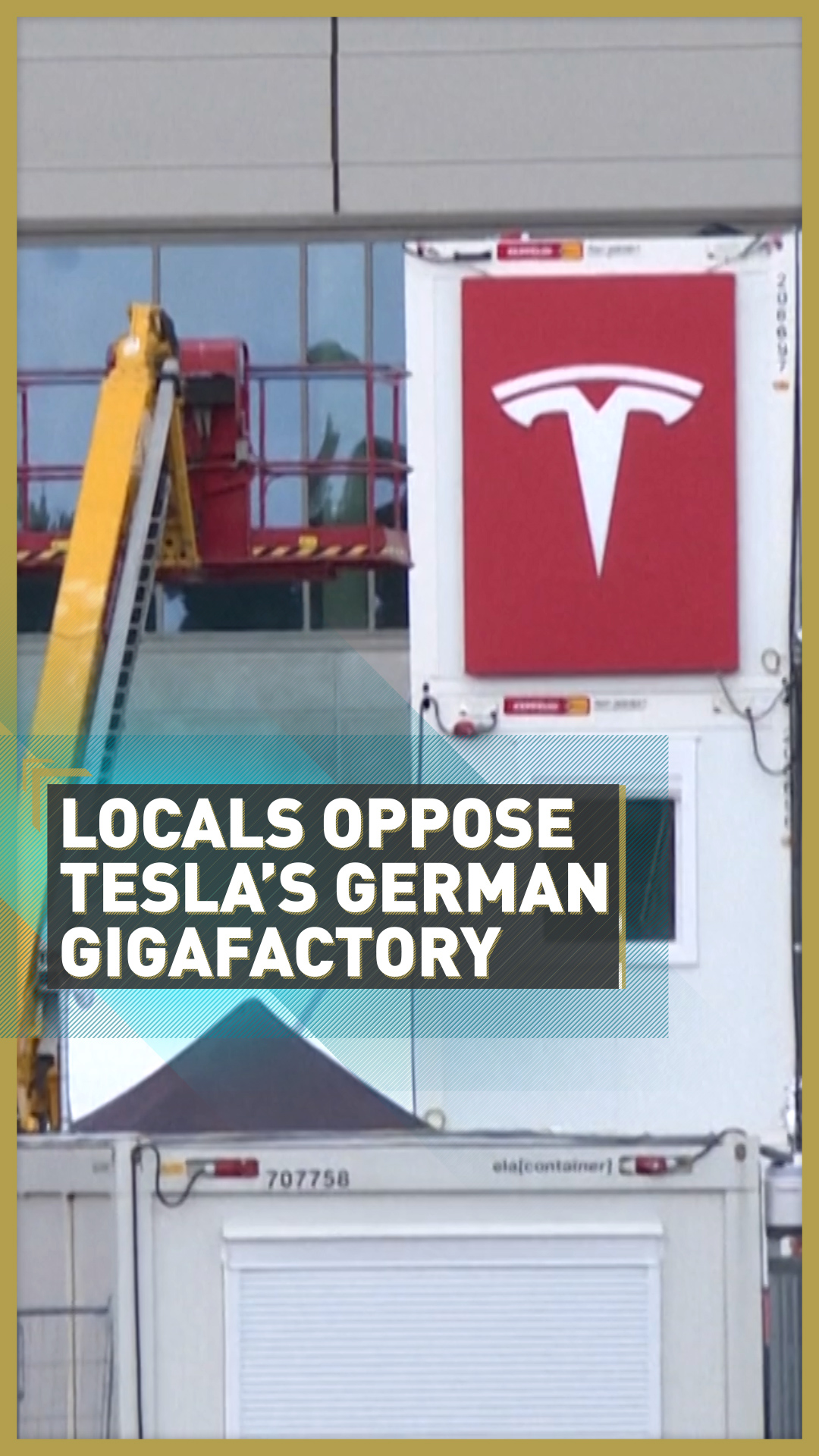01:48

When Tesla announced the opening of its first European factory in Germany in November 2019, the project was warmly welcomed as an endorsement of the country's car making industry and a boost to job creation.
But immediately after, residents of the Brandenburg region near Berlin, where the factory will rise, started opposing its construction – a David and Goliath-style fight that is still ongoing.
"When I saw on TV that the Tesla factory was going to be built here, I couldn't believe it," said Steffen Schorch, a 60-year-old from Erkner village and one of the environmental activists who have been protesting against Tesla's gigafactory, due to open in July.
The European plant is set to occupy more than three square kilometers – equivalent to approximately 560 soccer fields – of the green forest sprawling southwest of the German capital.

An excavator operates as work continues on U.S. electric car giant Tesla's European 'gigafactory' in Gruenheide, near Berlin. /John MacDougall/AFP
An excavator operates as work continues on U.S. electric car giant Tesla's European 'gigafactory' in Gruenheide, near Berlin. /John MacDougall/AFP
Swathes of coniferous forests will have to be cleared to make space for the U.S. electric carmaker's gigafactory, which Elon Musk said will be "the largest battery factory in the world," with the capacity to produce 500,000 electric vehicles a year.
Surely this is a small price to pay for a project which, according to Tesla, "helps fight climate change"? Local residents don't think so – and Germany's verdict on it is still uncertain.
Fragile reptile habitats and water shortages
In December, Tesla was forced to temporarily suspend forest clearing after campaigners from local environmental groups Nature and Biodiversity Conservation Union and the Green League won an injunction over threats to the habitats of lizards and snakes.
A German court ordered that Tesla immediately stopped chopping down trees that were hosting hibernating sand lizards and snakes who would have not survived the relocation efforts made by the U.S. company to protect the wildlife found on site.
After these small, temporary victories, campaigners have now shifted their focus on the factory's future water consumption.

Local environmental activist Steffen Schorch poses in a protected forest in the Loecknitz valley close to the site of U.S. electric car giant Tesla's European gigafactory. /John MacDougall/AFP
Local environmental activist Steffen Schorch poses in a protected forest in the Loecknitz valley close to the site of U.S. electric car giant Tesla's European gigafactory. /John MacDougall/AFP
"Tesla needs far too much water, and the region does not have this water," said Schorch.
"We also have to take climate change into account, we have less rainfall because of it. The water supplies are not being replenished and we have had very hot summers in the last three years, so we have more and more problems with water supply in the region."
According to Germany's ZDF public broadcaster, the gigafactory's water consumption could reach up to 3.6 million cubic meters a year, or around 30 percent of the Brandenburg region's available supply – already affected by shortages after three summers of drought.
"The water situation is bad, and will get worse," Heiko Baschin, a spokesman for the neighborhood association IG Freienbrink, told AFP – but Brandenburg's environment minister Axel Vogel said in March that "capacity has not been exceeded for now."

People look at a Tesla car on display at a shopping mall in Beijing on April 14, 2021. /Nicolas Asfouri/AFP
People look at a Tesla car on display at a shopping mall in Beijing on April 14, 2021. /Nicolas Asfouri/AFP
Germany's 'particularly irritating' slow bureaucracy
The plant's site only has provisional construction permits, and construction work is proceeding despite the lack of final authorization – which will depend on the environmental impact of the gigafactory and has been pending since Tesla filed for it 16 months ago.
Permit delays and the general slow pace of German bureaucracy have been harshly criticized by Tesla, which complained in a letter to Berlin's highest administrative court seen by AFP that "Tesla has experienced first-hand how obstacles in German authorization procedures slow down industrial transformation."
According to Tesla, Germany will "miss its climate targets" if it doesn't modernize itself soon.
In its letter, the company asked for reduced bureaucracy for its project on the basis that it helps the environment. But if the new plant will be found to be detrimental to the environment, in theory Tesla will have to dismantle it at its own expense.
For the same reason, Brandenburg's economy minister Joerg Steinbach raised the possibility in February that the Tesla factory could be delayed beyond its planned opening in July.
Video editing: Nuri Moseinco
Source(s): AFP

